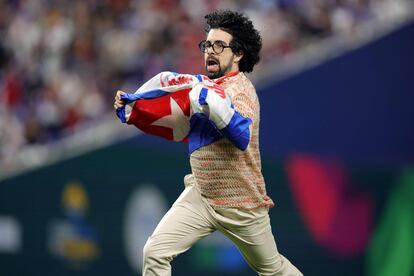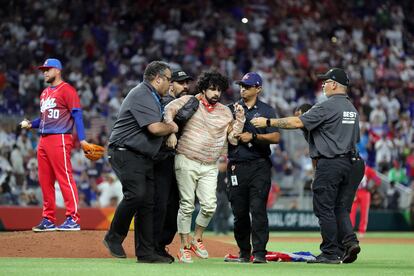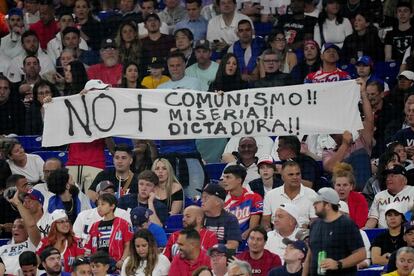Why did I jump into the field to interrupt the Cuba-US game?
Writer Carlos Manuel Álvarez reflects on the reasons that led him to invade a baseball match between his homeland and the country where he lives in exile

There is a picture in which I seem to stick out my tongue as I dance with the security guard of the Miami Marlins stadium. That, however, is an involuntary vignette; an unexpected image that materialized in the midst of the clamor, of the ecstasy. It was the eighth inning of the semifinal of the 5th World Baseball Classic between Cuba and the United States, appropriately taking place in a field in Little Havana – which for decades was the cultural heart of the anti-Castro exile and today is an insular museum populated by Central Americans. Improbability aligned the pieces of the political spectacle in a clear, coherent order.
No Major League team could afford the payroll of the Americans, a new kind of Dream Team. No money can pay for such quality. The Cuban team, on the other hand, bore an even more puzzling particularity. For the first time, it was made up by local baseball players, a small minority, and others who already belonged to foreign leagues, athletes whose exodus once made them traitors. This condition did not change for them; it just relocated. Now, a considerable part of the exile regarded them as accomplices of the communist regime for representing the country in a sporting event of such magnitude.
The inclusion in the team had a political bias. Players who in the past had left an official delegation could not participate, nor could anyone who had ever issued statements against the regime or any of its leaders. However, Roenis Elías, one of the team’s main pitchers, had declared shortly before: “I know that the government is trash, but I want to represent my country. Baseball is my thing.” Elías, who had also expressed his solidarity with the prisoners of the peaceful protests of July 11, also belonged to the independent organization that the Major League Baseball players had tried to promote a few months before the Classic, setting off the alarms of the Baseball Federation in Havana.

Other members of that separatist effort, such as José Adolis García (Texas Rangers) or Yordan Álvarez and José Abreu (Houston Astros), received the call from the Federation to participate in the Classic, but rejected the offer. Those who did accept, like Yoan Moncada and Luis Robert Jr. (Chicago White Sox), distanced themselves from any act of political propaganda, aware that the leaders dispatch sports delegations as if they were sending them off to war. Athletes become the docile instruments of triumphalist rhetoric. The players agreed not to make any provocative statements and to keep to themselves any inappropriate ideas or ideological confusions they might have picked up in the poisoned land of capitalism. A pact of silence sealed the experiment.
In Miami, a journalist asked Moncada if he identified with the motto Patria y Vida (Homeland and life), the slogan of civic resistance in Cuba. Moncada kept quiet, unable to hide his bewilderment, almost as if he was in Havana and they were asking him who he was dedicating the victory to. For decades, reporters used to corner the winning athletes in any international event in this manner. The triumph had to be dedicated to the commander in chief. However, some unaired scenes transpired behind these confrontations: catcher Ariel Martínez, hired in Japan through the Cuban Federation, cheerfully declared that he loved Miami so much that he would even like to play for the city’s team. When asked if he would eat a sandwich at the Versailles restaurant (the legendary headquarters of political protests in exile), he replied that, at the Versailles, he would have a sandwich and whatever else is there. Had someone expressed something of the sort in the past, they simply would not have been able to return to the island.
I still believed — despite the marked efforts of many to reject a team that was manipulated by the totalitarian machine; a team that did not say everything they wanted to hear, in the way that they wanted to hear it — that exile had disembarked and conquered part of the heart of Castro’s symbology. Of course, we were not facing an absolute change of tone; in politics, desire is always a partial gain, but we had made quite a milestone. For the first time, baseball players didn’t resemble soldiers, but people; that, more than soldiers from a different army, was the denial of Castroism for me.

That team, which debuted with two defeats, was nothing, a trifle, a symbol of a broken country, and the initial contempt gave them a reason and gifted them the treasure of rage. After that they bagged three consecutive victories that took them to the semifinals in Miami. They invented rituals, a set of festive gestures, suddenly possessed by a rare pleasure that the Cuban teams had not experienced before, or that, at least in the last decade, they had only pretended to feel. It didn’t look like a communist team because it wasn’t a frightened team, and from the moment a batter from the Cuban National Series appeared in the lineup behind a star of the Big Leagues, people didn’t quite know what to make of them.
Anyone who has experienced it knows that, since the 10-million-ton harvest [a failed agricultural campaign from the 1970s that aimed to produce 10 million tons of sugarcane in one year], when totalitarianism most exaggerates its triumphant grimace is when it least triumphs. This explained the effort (useless, from my point of view) to adapt that mixed set, which contaminated the purity of the segregative ideology, to the mold of Newspeak. I also thought that a political alternative could not be built from cynicism, and after all, one always has to want something. One cannot afford to suppress pleasure in the forms of reparation of justice. However, apart from certain politicians, some flashy influencers, and almost everyone who has turned the slogan of freedom into a business, there remained a humiliated people, an unpardoned exodus, to whom my proposal – reasonably – still seemed flawed.
***
I got to the Marlins stadium early in the afternoon. Thousands of Cubans milled around from many positions or affective combinations. I even found fans wearing Team Asere shirts (that nickname, which emerged from a meme site, was effusively adopted by the regime’s top brass, immediately spoiling it). So many intricacies made my position even stranger, determined to rescue the players from outrage, trying to find in them signs that would let me appropriate them without becoming part of the established modes of celebration.
Like Michelet, I could say that “I love the people, but I hate a mob.” Outside, in the obligatory protests, I perceived the deep civic spirit of Ramón Saúl Sánchez, an exile leader and a particular type of patriot on the verge of extinction, an elegant, austere, calm man, who wore a guayabera shirt and called for peaceful protest without opposing the game. I was moved by his presence; how was it possible that this man could not live in his own country?
The match turned into a mess in no time. The United States overpowered Cuba from the beginning and the focus shifted immediately, turning it into a different kind of duel. In the fifth inning, graffiti artist Danilo Maldonado, known as El Sexto, charged onto the diamond from the center field with a sign calling for the release of the July 11 political prisoners. It was an inspiration. The crowd did the wave and chanted slogans for national reaffirmation or against communism. The shocking gesture inaugurated the season of disobedience; a while later, a guy named Antonio Fernández would do the same. Afterwards, I spent the entire early morning with him in a prison in Doral, Florida.
Then I felt a familiar fear. I talked to my girlfriend and we planned something. I went to the bathroom and walked for a while around the third section corridor, frightened. First I had to shake off that spasm. Once the fear is overcome, that is, once it has been exhausted, suffered, the deed occurs automatically in a series of impersonal steps. This detachment guarantees action; the shock hits later. We walked to the right field area, where the protective mesh ends, and I asked a fan for his Cuban flag with the Patria y Vida sign. My girlfriend suggested a lady that she make a video with her phone. I ran downstairs and suddenly fell on the ground, stunned.
A slow man, almost limping, tried to block me, but I moved diagonally towards the second base and left him behind easily. The open field laid before me like the possibility of a dazzling prank. I invaded the diamond between first and second and, near the lime line, I stopped in front of the visitors’ dugout. It was the bench of the Cuban team, my team, the squad for which my heart had bled since I was a child and, for that very reason, the squad I had to face in order to destroy each other, if need be, in an excruciating dance of failure mixed with love. There is no route to freedom that does not desecrate our altar of emotion.
I should have run more, but I tried to move backwards and a group of uniformed men subdued me. A big man tackled me spectacularly and my head bounced off the grass. I was never able to fully unfurl the flag; the wind ruffled it but it also filled it like the sail of a ship stranded in a pool of light, which is, after all, what a ball field is. “Look over here,” I wanted to tell the Cuban team without opening my mouth. “What are we going to do?” I trusted the language of my sprint.
Later I learned that for some — prisoners of the didacticism of slogans, an evil of Castroism that was unfortunately exported to exile — the flag and my run did not mean enough. But my body was the meaning, because it was the body of an outcast. What else? Why would I run then? I was also grateful for the loose sign, which no one could appropriate entirely. I intended to offer a play that would also happily deny me. In the heart of exile, a place so powerful, that I also inhabit in my own right, the gesture could include my opponents. Freedom is the risk of being confused, as well as the fulfillment of assuming that confusion as one’s own. I needed to act in spaces where what I am did not entirely depend on me.
Back on the street after ten hours of detention, I received majority support. So much so that it was embarrassing, although I think that has to do with the fact that we are saturated with words and lack facts, even facts outside of Cuba, with much less consequences than any act committed from inside the pressure cooker. However, I also had to deal with characters like the writer Néstor Díaz de Villegas, who tried to exile me from my own gesture and turn it into an illiberal episode, a decrepit fable of self-pity.
In any case, such efforts are ultimately fruitless, because the trick is that you have to arrive running and keep running after you leave. That moment in the stadium was just another instance in which my career briefly emerged into the public eye before returning to the shadows. “Why did you do it?” a policeman asked on the way to the prison. “Because I have friends who are political prisoners,” I told him. Also, to paraphrase an idea by the poet Wislawa Szymborska, I prefer the ridiculousness of jumping into a ball field to the ridiculousness of not jumping into a ball field.
I don’t have to ask for anyone’s permission, not even my formerly beloved team’s, to belong to my country.
Sign up for our weekly newsletter to get more English-language news coverage from EL PAÍS USA Edition
Tu suscripción se está usando en otro dispositivo
¿Quieres añadir otro usuario a tu suscripción?
Si continúas leyendo en este dispositivo, no se podrá leer en el otro.
FlechaTu suscripción se está usando en otro dispositivo y solo puedes acceder a EL PAÍS desde un dispositivo a la vez.
Si quieres compartir tu cuenta, cambia tu suscripción a la modalidad Premium, así podrás añadir otro usuario. Cada uno accederá con su propia cuenta de email, lo que os permitirá personalizar vuestra experiencia en EL PAÍS.
¿Tienes una suscripción de empresa? Accede aquí para contratar más cuentas.
En el caso de no saber quién está usando tu cuenta, te recomendamos cambiar tu contraseña aquí.
Si decides continuar compartiendo tu cuenta, este mensaje se mostrará en tu dispositivo y en el de la otra persona que está usando tu cuenta de forma indefinida, afectando a tu experiencia de lectura. Puedes consultar aquí los términos y condiciones de la suscripción digital.








































